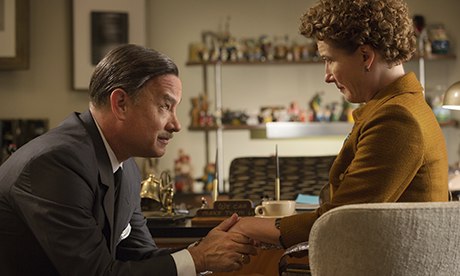The Hobbit, American Hustle, Saving Mr. Banks

In theaters…
-Here we go ‘round the merry go-round again. “The Hobbit: The Desolation Of Smaug” effectively makes this franchise very much like the last guy at the party, starting to do magic tricks in order to keep people from going home. This time around, that magic is an elf army headed by good old Legolas, who makes eyes at Tauriel, who in turn makes eyes at the handsome dwarf, Gloink or Barin or something, with none of it based on anything other than Middle Earth sweet nothings. Anything to distract from the endless CGI battles, which have aged as a concept, let alone a spectacle, since those last “Lord of the Rings” films. Jackson still has that merry sense of chaos and choreography, but who cares if it’s just bowling pins? This movie has even less of its protagonist than the first film, drowning Martin Freeman’s Bilbo Baggins under a mess of coincidence and happenstance that includes Luke Evans’ seafaring rogue who… let’s face it, Hollywood, you’re not going to make Luke Evans happen. It all hinges on a conclusion that hammers home the fact that a third film promises only eight hundred more climaxes, a few winks to the “LOTR” films, and more dragon shit. At this point, Jackson’s ingenuity remains, but if you were to replace him with Rob Bowman at this point, would anyone give a shit?

-David O. Russell is not one of our “great” filmmakers, and that’s ok. His “American Hustle” is, like the best moments in his filmography, a great pleasure to sit through, but his films have now settled into that sloppy ramshackle method of storytelling that highlights actors and downplays escalation or stakes-raising in any real way, even when the script demands it. He’s something of a serious David Wain, in that respect, though with greater empathy for human beings. The standouts here are the moments when O. Russell lets the soundtrack blare, underlining the grace notes left by a sterling cast, including a riotous Christian Bale sporting the world’s swankiest combover and beer belly. Bale is nearly matched by the fiery Amy Adams, and his poker-face plays like magic against Jennifer Lawrence’s volcanic turn. Bradley Cooper fades away in comparison, and it’s not that Cooper’s character is a manic wannabe, but rather that you can see him trying to exert his force over the material, while Bale oozes weird sexual desire and intelligence. Halfway through the film, Cooper’s character flips a switch from stable to rock ‘n’ roll, and it’s a customary O. Russell character shift. Poor Cooper, like his character, only comes across as a pretender.

-What slop is this that we’re taking seriously a movie like “Saving Mr. Banks,” which celebrates Walt Disney as a charmer who manipulated P.L. Travers into adding to his coffers, signing her work away to become Disney bauble “Marry Poppins”? “Saving Mr. Banks” is probably the best version of the movie it could be, which is to say professionals got together to create this odious ode to corporate power and largesse over plucky writerly ingenuity. Of course, the crowning stroke is the 20% of the movie dedicated to Travers’ childhood, where we’re forced to endure Colin Farrell’s obnoxiously plucky alcoholic dad, a flighty sort you might remember from any number of intolerable stories about “magic parents” that never misses an opportunity for playtime and finds enough opportunities to clown while a disapproving woman (here Ruth Wilson) angrily crosses her arms. It’s movie mythmaking for morons, and if you’d like, please help yourself, and try not to speak to me.